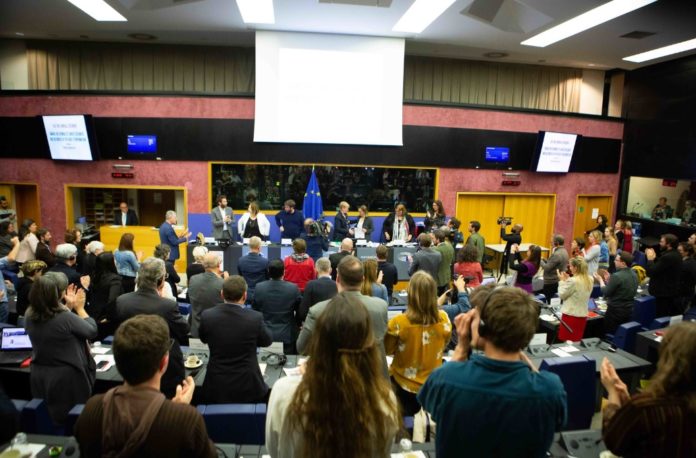Brussels (NEV), Aprile 17th – On 9th April the European Parliament in Brussels hosted the Permanent Peoples’ Tribunal (PPT) as it presented its findings on the violation of human rights of migrants and refugee people. PPT judges, MEPs, and representatives from civil society all contributed to the lively hearing, following which a demonstration in support of migrants took place at Rond-Point Schuman.
A huge network of organisations jointly submitted an indictment to the PPT in 2017 and, since then, the PPT has taken testimony from over 500 people at hearings in Palermo, Barcelona, London and Paris. Trenchant judgments followed each hearing, each focusing on specific aspects of European migration policy. This 45th session of the PPT did not shy from making a direct link between EU policy, national action and the current suffering of migrants attempting to reach and live in Europe.
In its final report the PPT called for the following:
- A complete revision of the EU’s economic, migrant and asylum policies to permit development of countries from which migrants flee;
- Public and transparent procedures for concluding agreements which fully involve the European Parliament;
- A moratorium on all agreements, such as the Italy-Libya agreement, lacking public oversight;
- An end to hostility against and criminalisation of NGOs involved in SAR;
- Suspension of measures designed to obstruct action by civil society solidarity organisations;
- Action to counter practices fuelling xenophobia, hatred and a hostile environment.
Highlighting the fact that what is often called a migrant crisis is, in reality, a profound crisis within the EU, the PPT noted the contradiction between the EU’s stated commitment to the universality of fundamental rights and its adoption of policies which ignore or violate those of refugees and migrants.
Particular criticism was made of Italian migration policy, in particular, the action taken to ban and push back NGO ships, agreements concluded with the Libyan coastguard and the memorandum between Italy and Libya of 2 February 2017, since which time countless deaths, deportations, disappearances, arbitrary imprisonment, torture, rape and enslavement of migrants have taken place.
As a tribunal, the PPT has no legal force – but neither is it constrained by standard legal definitions and jurisprudence. It is therefore able to submit that “system crimes” have been committed by the EU: “the tragic effects of economic policies and decisions that sacrifice fundamental rights”.
Such rights should never, said the tribunal, “be sacrificed under the pretext of security, which is only being used as a means of gleaning electoral support”. The EU alone has the wherewithal to create and implement structural policies and interventions needed to tackle the factors driving migration. However, whilst the EU approach to migration remains fractured, that opportunity to generate change may be lost. In these circumstances, the significance of the forthcoming EU elections and the Parliament’s future role in driving change cannot be underestimated.
The indictment, judgements and final document can all be accessed here: https://bit.ly/2IyYS4p





























